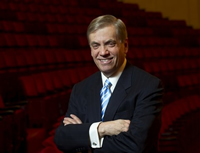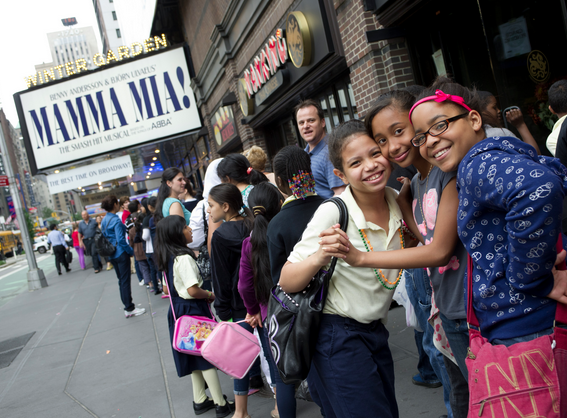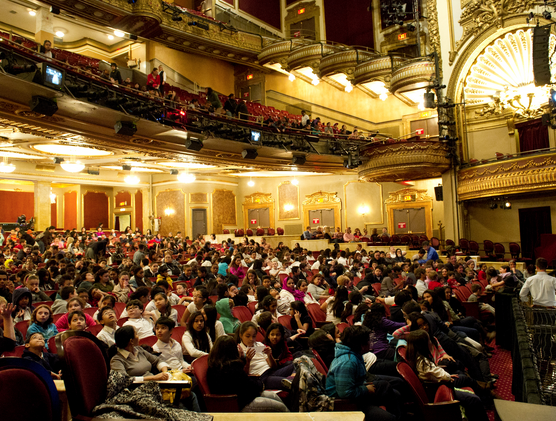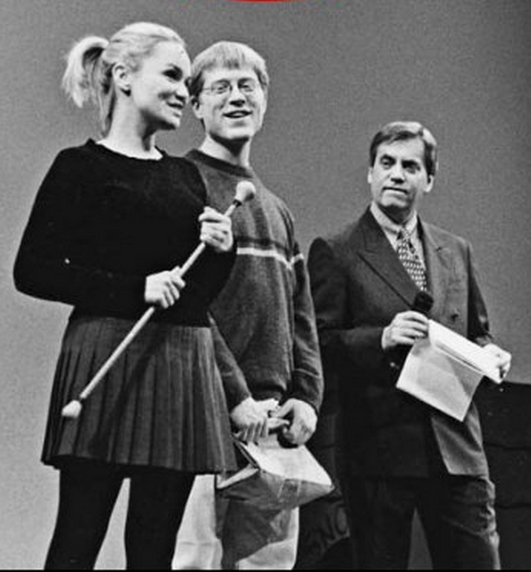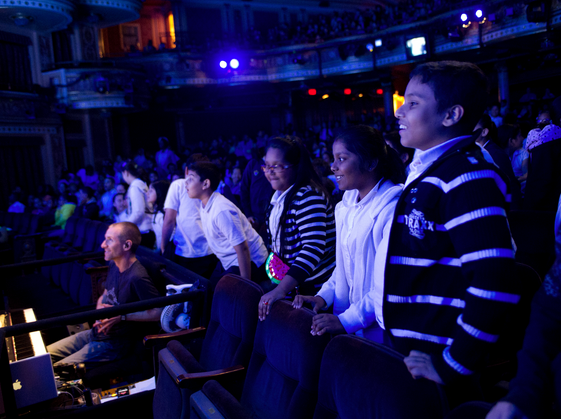Filichia Features: Creating the Magic with Michael Presser
Filichia Features: Creating the Magic with Michael Presser
Michael Presser, Executive Director of Inside Broadway
When Michael Presser was a wee student in junior high (which is what we used to call middle school), he opened up the newspaper and saw a full-page ad for the then-new musical How To Succeed In Business Without Really Trying.
Well, with a logo like that, who wouldn’t be intrigued? More enticing still was the news that it would open on September 4 at the Shubert in his hometown of Philadelphia.
“So I tried to get my parents to take me, and they wouldn’t,” Presser reports. “I tried other people, too, but no one would do it. So I bravely asked my parents ‘Would you let me go alone?’”
Bless them, they did, and Presser was one of the first to discover what would be the 1961-62 victor for the Best Musical Tony Award and only the fourth musical to win the Pulitzer Prize.
Now, for nearly the last third of a century, Presser has made attending the theater much easier for middle-schoolers, high-schoolers and even some elementary school students than it was for him to see great big Broadway shows. Thanks to his organization Inside Broadway, he’s been the conduit to giving free tickets to many New York City students.
“We’re up to ninety-five schools now,” Presser says with justifiable pride. “We reach almost thirty thousand kids a year. We’re encouraging new audiences, replacing old audiences and instilling in teachers a love of musical theater that they can pass down to their students.”
(But if you’re NOT a teacher from a New York City school, don’t stop reading. Presser may be able to help you in yet another way. Stay tuned. Patience is a virtue -- and I know you’re virtuous.)
Inside Broadway’s roots date back to 1982, when Bernard B. Jacobs, then in his tenth year as president of The Shubert Organization, thought something more could be done with audience development. Presser happened to be in the right place at the right time and got the assignment to bring one New York City class to each Wednesday matinee – and not to Play Me a Country Song or Cleavage. The kids would get to see the biggest thing to hit Broadway in years: Cats.
“And for eighteen-and-a-half years,” Presser says, “we indeed brought in a class every Wednesday to see that show. Bernie wanted the non-performing-arts schools to have interaction with live theater to reinforce classroom activities.
Presser’s company didn’t stop with Grizabella’s ascending to the Heaviside Layer. He enlisted other Cameron Mackintosh productions, including Les Miserables, Miss Saigon and Phantom of the Opera. “Over the years, other theater owners have helped us, too,” he says. “But the Shuberts have been the real champions, with Dreamgirls being especially good to us.
Eventually Presser began sending actors, directors and choreographers to the students’ schools to help them with their own productions. He also wondered if merely showing kids what happens on stage was enough.
So a quarter-century ago he started hosting “Creating the Magic,” hour-long programs that introduce lesser-known but vital employees of a musical production. “We couldn’t have done it without the support of The New York City Council, the Department of Cultural Affairs and the Department of Education,” he says, emphatically giving credit where it’s so rightfully due.
Presser’s now been at this long enough that many a teacher has come up to him and said, “You know, I was one of the kids who came to see one of your shows a long time ago, and it got me on the road to appreciating Broadway, musicals and the arts.”
A couple of weeks ago, in front of hundreds of kids sitting in the Gershwin Theatre, Presser took to the stage to emcee a program on how Wicked creates the magic. Historian that he is, however, he took the time to tell the students exactly who this Mr. Gershwin was.
That never hurts.
He then did a quick synopsis of Wicked, starting with a lesson everyone needs to learn -- and the sooner, the better: “There are always two sides to every story.” The students can easily empathize with Elphaba, for many of them have felt as if they’ve been as shunned as she even if their faces have never been remotely green. They also see that Glinda is, metaphorically speaking, first cousin to Elle Woods in Legally Blonde; both start out as bubble-headed bobbleheads before they get much better heads on their shoulders.
Presser then brought on some Wicked staffers -- even going so far as to have one fly in and defy gravity. Dance captain Alicia L. Albright told that her job is to maintain Wayne Cilento’s original choreography so that it doesn’t vary from what the audience saw on opening night lo those many years ago. Conductor David Evans took a bow, and Tom Olcott, the financial Vice-President of Local 802 – more chummily known as “the musicians’ union” – explained precisely what unions do. He also revealed that while twenty-five musicians play Wicked, there isn’t enough room in the pit for all, so twenty-three are in front of the stage while two are in an off-stage room and their music is piped in.
There’s room enough in the house, however, for the ninety-two speakers for which three staffers pipe in sound. That number pales in comparison to the show’s 670 lights, each of which must be checked before every performance. The radio-controlled wheelchair in which Nessarose sits zoomed around the stage. The big unit that shows the face of The Great and Terrible Oz was brought out and spun around, too. The students did pay attention to the man behind the unit, who showed them the mass of intricate pieces, pipes and wires that resemble something out of a mad scientist’s workshop.
The kids also got a sampling of Stephen Schwartz’ score, with Carla Stickler doing Elphaba’s “The Wizard and I” and “No Good Deed,” Tess Soltau explaining what it takes to be “Popular” and William Ryall being downright “Wonderful.” Bill Ryall, the nineteenth actor to play The Wizard, referred to the show as “a fast-moving train that I had to get on” – meaning that dozens of people on stage and in the wings knew what they were doing while he was trying to play catch-up.
What is always most wonderful about Presser is that he asks each and every person he’s interviewing “And where did you get your education?” No one ever says, “Oh, I dropped out of high school as soon as I could, because who needed that?” Everyone lists his academic credentials with pride, subtly getting across to the kids in the audience just how vital and necessary education is.
Presser says, “When parents ask their kids ‘What did you do in school today?’ we’re able to have them say ‘A professional dancer came to our school to teach us’ or ‘We went to a Broadway musical.’ And that’s something special.”
So if you’re a New York City teacher who’s interested in either the ticket program or “Creating the Magic,” get in touch with Presser at 212-245-0710 or at insidebroadway@gmail.com.
And what of you teachers from Philly, Boston and Baltimore – not to mention Monowi, Nebraska or Picher, Oklahoma? Here’s the deal: IF you’re coming to town with your kids on a field trip to see shows, do check in with Presser to see if he’s planning a “Creating the Magic” event while you’re here.
“If the theater’s big enough,” he says, “we’ll squeeze you in.”
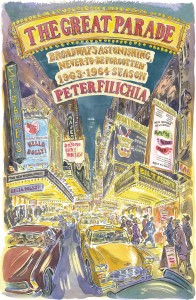
You may e-mail Peter at pfilichia@aol.com. Check out his weekly column each Monday at www.broadwayselect.com, Tuesday at www.masterworksbroadway.com and Friday at www.kritzerland.com. His book The Great Parade: Broadway’s Astonishing, Never-To-Be Forgotten 1963-1964 Season is now available at www.amazon.com.
